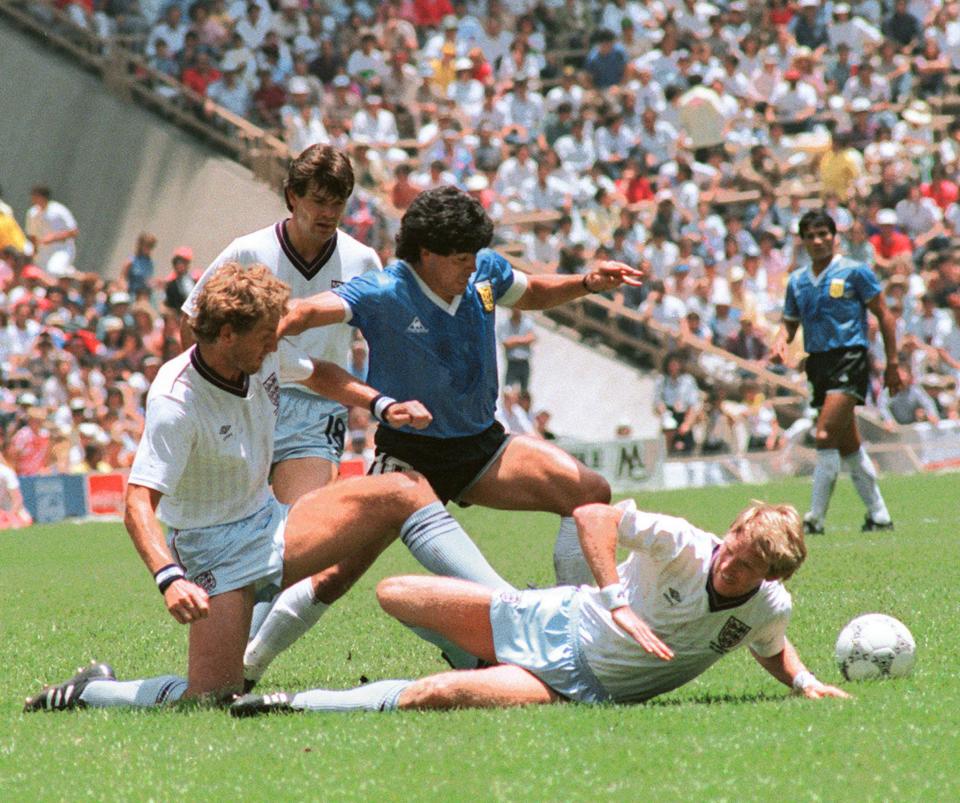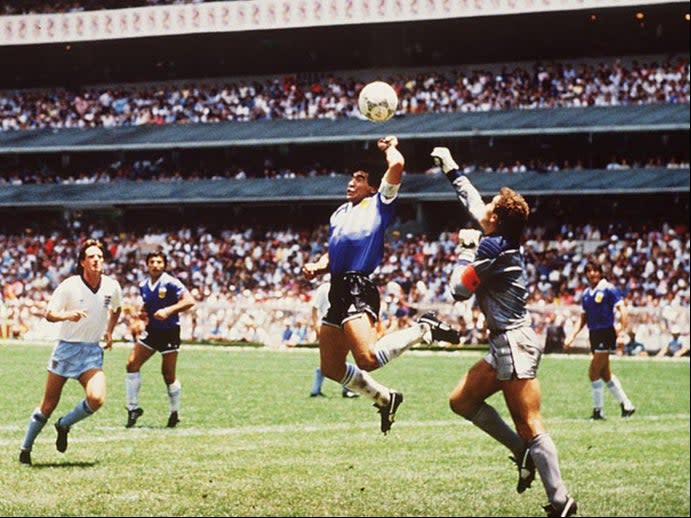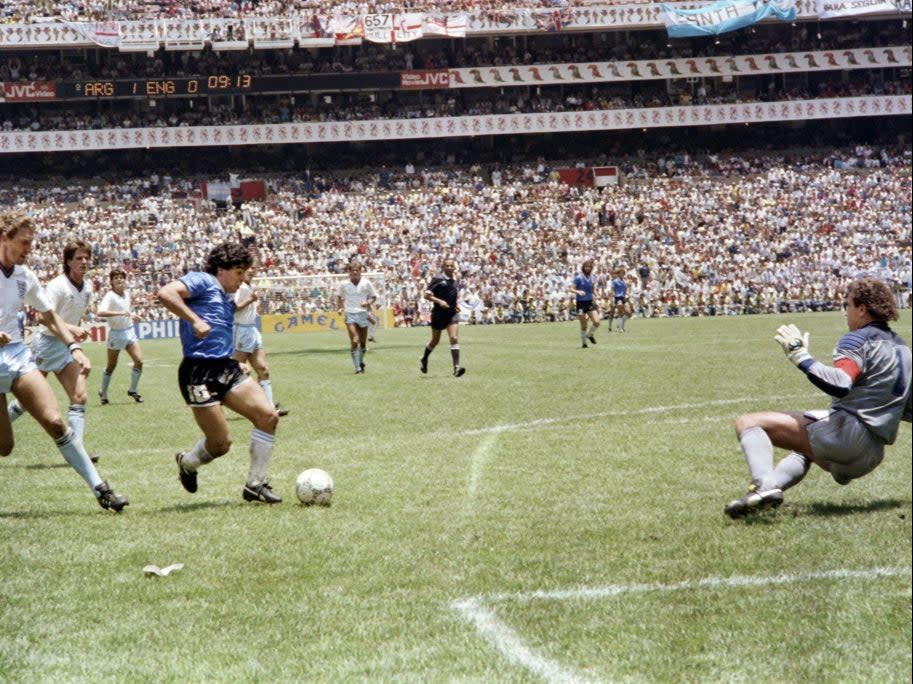Diego Maradona: Time for English football to let it go and appreciate his genius

Diego Maradona glides through England’s defence at the 1986 World Cup
(AFP via Getty Images)“Maradona, turns like a little eel. He comes away from trouble, little squat man, comes inside Butcher and leaves him for dead, outside Fenwick and leaves him for dead, and puts the ball away. And that is why Maradona is the greatest player in the world.” - Bryon Butler
To describe English football’s relationship with the 20th century’s greatest footballer as complicated would be an understatement.
For much of the English public, memories of Diego Maradona - who has died at the age of 60 after suffering a heart attack - are simultaneously of an otherworldly talent who transcended all that came before him and of a man responsible for the most infamous act of larceny ever committed on a football pitch.
Memories of that Mexico City quarter-final at the 1986 World Cup - four years and a week after the end of the Falklands War - are similarly at odds with each other.
READ MORE: ‘Like touching the sky with your hands’: The genius and joy of Diego Maradona
It is popularly thought of as another painful defeat at a major international tournament and this time of an honest team who played by the rules only to be cheated in the biggest game of their lives.
At the same time, it was also the scene of possibly the finest individual goal ever scored and English football’s walk-on part in the purest story that this sport can tell: of the greatest player leading his team to glory on its grandest stage.
The cognitive dissonance of that quarter-final, its goals and perhaps of Maradona himself is not best captured in the contemporary match reports of a British newspaper - or even an Argentinean one - but by the German press agency DPA, who described his first that day as “the scandal of the century” and his second as “the goal of the century”.
Both are etched into the memories of the England players who were involved. Some memories are more bitter than others.

Diego Maradona of Argentina handles the ball past Peter Shilton
Bongarts/GettySteve Hodge, whose sliced clearance sent the ball back towards England’s goal and into Maradona’s path, would at least walk away from the Azteca Stadium with his shirt, having sought him out at full time. When he returned to England’s team hotel, he unpacked it in front of his roommate Peter Reid.
“Suffice to say, I wasn’t too pleased with this,” Reid recalled nine years ago. “I gave Hodgey the biggest bollocking he’s ever had in his life.” And while Hodge would release an autobiography titled The Man With Maradona’s Shirt, Reid has done everything he can to repress the memory.
“I never knew a single football match could have such a lasting effect on my life,” he wrote in the Daily Mirror two years ago. “It still hurts that he finished us off with his feet after opening the scoring with his hand – and I have had to come to terms with the fact that I may never get over it.”
The greatest sense of injustice, though, is Shilton’s. The most-capped player in England’s history has never forgiven Maradona for his act - he turned down the olive branch of appearing alongside him on a television programme a few years ago - and after his great adversary’s passing says he still doesn’t.
“I never left my goal area unless I was certain that I would win the ball,” Shilton wrote of the key moment in his 2004 autobiography. “I knew I had to leave my line to win this ball and, what’s more, I knew I would win it.” That frustration of knowing that 'if not for the hand, it was his' has fuelled a certain resentment for the past 34 years.
But what is widely forgotten about Maradona is that the cunning he employed was his response to the brutality he routinely faced from his opponents.
That day in Mexico City was no different. “We had a detail that whenever he was on the ball, the nearest man had to get at him quick and liven him up,” Terry Fenwick, the former England centre-half, told the Second Captains podcast earlier this year.
Fenwick was in a particularly belligerent mood, scything through Maradona’s legs after just eight minutes. Despite earning a yellow card for that challenge, he avoided seeing red for an apparent - and potentially accidental - elbow to Maradona’s face. Hodge, Reid and Peter Beardsley were among others to target him.

Diego Maradona dribbles past Terry Butcher
AFPIt was not that honest, Corinthian-esque performance that many would like to remember.
But if England could give as good as they got when it came to bending and breaking the rules, they fell well short to Maradona on pure footballing ability.
That is the story of the second, four minutes after the first, and ‘the goal of the century’. Beardsley, Reid, Fenwick and Terry Butcher are all beaten. Butcher is beaten twice. “That's the closest I ever got to him on the pitch apart from the doping room after the game,” he has said when confronted with the image of him helplessly chasing Maradona, who is already bearing down on Shilton.
Reid still has nightmares. “In my dreams, I'm still running but there's a wind against me,” he has recalled. “No matter how hard I try, I can't get there.” Even Shilton has to appreciate its majesty. “In scoring that solo goal, he had proved to the watching world that he was one of the all-time great footballers,” he wrote. And in fairness to Shilton, he has never denied that greatness.
For some, the memories will always be too vivid and too painful - a few of Thursday morning's front and back pages hinted as much - but surely now, upon his sad passing, it is time to let it go.
That little squat man, turning like a little eel of Butler’s peerless commentary made English football suffer at the hand of his dark arts.
But the second of those goals will be replayed over and over again across the coming days and as it is, it will be difficult - even for those who still hold a grudge - to appreciate anything but the light of his genius.
Read More
Diego Maradona: Footballer who dominated the game like a god
Gascoigne shares brilliant Maradona story in tribute to Argentine
Watch Maradona’s greatest Napoli moments
Napoli considering renaming stadium after Maradona following death
‘Diego is eternal’: Messi pays tribute to Argentine icon Maradona
Maradona was the two-faced god of football who never grew up